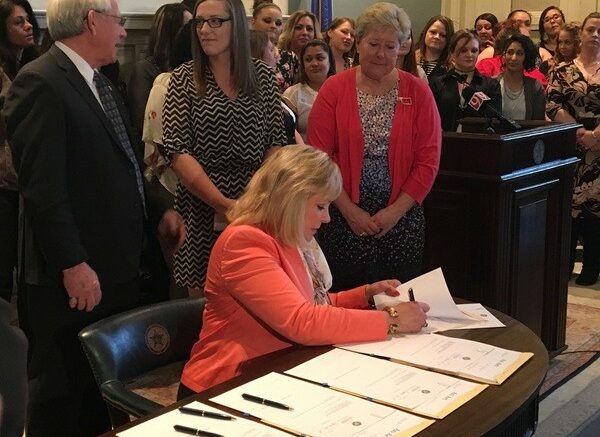OKLAHOMA CITY – Governor Mary Fallin today signed seven criminal justice reform bills that will reduce the flow of nonviolent offenders into prison; establish a more efficient and streamlined parole process; and facilitate successful reentry that reduces recidivism.
“Studies have shown that with our current laws Oklahoma’s prison population will grow 25 percent by 2026 and cost the state an additional $1.9 billion,” said Fallin. “Criminal justice reform has been an incredibly important issue for our state. We can be smart on crime and tough on violent violent offenders.
“Over a year ago I charged the Oklahoma Justice Reform Task Force with examining our state’s justice system to make efficient use of our limited state resources. Task force members developed these recommendations that were the framework for these bills. I appreciate lawmakers for their bipartisan approval of these vital measures.
“Our state prisons are filled to well over capacity so it is crucial that we make some changes to our criminal justice system,” Fallin said. “These bills will not jeopardize public safety while addressing Oklahoma’s prison population. Too few Oklahomans are getting the treatment they need for substance abuse and mental health issues, and are instead winding up in our criminal justice system. As I said in my State of the State address at the beginning of this legislative session, we need to stop warehousing moms and dads, son and daughters in prison when many just need substance abuse treatment.”
“Oklahoma cannot afford the status quo,” said Senate Majority Floor Leader Greg Treat. “Our prison population is currently at 113 percent of capacity, and is projected to grow 25 percent by 2026. That is an unacceptable trajectory for our state and its people. These reforms will slow the growth in the prison population long-term. The savings Oklahoma will see from reduced corrections’ costs will be substantial, and will allow further investment in areas like education, health care, and mental health services that will further reduce crime and the prison population. The Legislature, criminal justice reform advocates, and law enforcement are in agreement on these reforms after years of work. This is a balanced, smart approach to keep our communities safe, keep more people as productive, taxpaying members of society, and keep more families together.”
“It was an honor to be part of the governor’s Oklahoma Justice Reform Task Force, and I believe we have taken some incredible steps as a state during the last 18 months,” said House Majority Whip Terry O’Donnell. “Nearly all Oklahomans agree that their tax dollars are better spent on core services like education, health care, and roads and bridges than incarcerating too many people for too long. Today marks a new direction for Oklahoma on criminal justice and incarceration. These measures are based upon data-driven, proven solutions that will safely reduce our prison population, save taxpayers millions of dollars each year, and help keep families together.”
The governor signed the following measures:
- Senate Bill (SB) 650, which authorizes no more than one nonviolent felony to apply for expungement if they have no new convictions or pending charges within the last seven years.
- SB 786, which eliminates the mandatory minimum and allow a judge to sentence up to the current maximum sentence of seven years in prison for burglary in the second degree, and would create a new felony offense, burglary in the third degree (defined as breaking into a vehicle), punishable by up to five years in prison.
- SB 649, which reduces enhanced sentences for certain repeat nonviolent felonies.
- SB 689, which creates risk and needs assessment as a tool for sentencing.
- SB 793, which changes the penalties for commercial drug offenses, and distinguishes conduct by possession with intent to distribute, distribution, and manufacturing.
- House Bill (HB) 2281, which adjusts penalties for numerous low-level property offenses, including larceny, forgery and other “paper crimes.”
HB 2286, which creates an administrative parole process for nonviolent offenders who comply with case plans in prison so that the Pardon and Parole Board can focus on more serious offenders, and would establish a geriatric parole release process for inmates who are 60 and older and who have been determined to not be a public safety risk.




Be the first to comment on "Governor signs criminal justice reform bills"